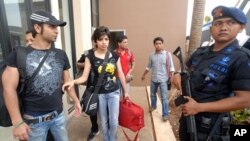An accused human trafficker says that Australia's plans to deport asylum seekers to other Asia-Pacific countries will fail to deter others because they are in genuine need of protection.
Sayeed Abbas Azad has been arrested in Indonesia at the request of the Australian government. Canberra plans to send asylum seekers to Malaysia and Papua New Guinea in an effort to stop a steady flow of asylum seekers arriving by boat.
Canberra accuses Azad of helping to ferry asylum seekers into Australian waters and wants him extradited. Immigration officials believe the suspect masterminded the voyages of several vessels from the Indonesian archipelago, including one that was intercepted earlier this month near Christmas Island, an Australian territory in the Indian Ocean.
He denies the allegations and told the Australian Broadcasting Corporation that Canberra’s plans to deport asylum seekers to other countries will fail because those who travel to Australia by boat genuinely need protection and will still risk the trip.
“They are looking for asylum because Australia is a good country. They will be protected, and besides, they're asylum seekers. They are not terrorists or something like that,” Azad said.
In Canberra, ministers believe that deporting asylum seekers will deter others who are thinking of making the journey to Australia by boat. Many of the asylum seekers are believed to come from countries like Afghanistan and Pakistan,
Canberra plans to send detainees to Malaysia and has also convinced Papua New Guinea to reopen a processing center on Manus Island. It was part of John Howard’s “Pacific Solution”, where the former conservative prime minister transported asylum seekers to remote offshore camps. The policy was widely condemned as inhumane and was scrapped after the Labor party came to power in 2007.
But political realities, in particular a steady flow of boatpeople and an electorate demanding tougher border controls, have forced Prime Minister Julia Gillard to look for solutions overseas.
“We've decided that it's appropriate, with the Malaysia arrangement and it's very, very tough message to people smugglers, to also have a center in PNG [Papua New Guinea]," Gillard said.
The prime minister says despite the new deportation plans, her government is using a different model from the Howard government based on the Bali Framework on Human Trafficking, agreed to by 41 Asia Pacific nations in March.
“What we've done instead is worked regionally to get the Bali Framework," Gillard said. "We will have a bilateral arrangement with PNG now, but we will stay engaged with our region on the question of a regional assessment center because we've always understood that this is an issue for our whole region.”
The Bali Framework is a non-binding agreement that outlines how nations should deal with people smugglers and asylum seekers. It is aimed at finding ways for countries to work together to undermine the incentives for human trafficking, while recognizing the dignity and rights of asylum seekers.
Refugee groups say the deal with Papua New Guinea is a return to the bad old days when the rights of asylum seekers were ignored. The outcome of a High Court challenge to Australia's plan to send 800 asylum seekers to Malaysia in exchange for 4,000 certified refugees is expected next week.
There has been no official reaction in Australia to Malaysia’s decision to send a group of ethnic Uighurs back to China. Rights groups have, however, urged Kuala Lumpur to end to such deportations over fears of mistreatment and even torture back in China.













